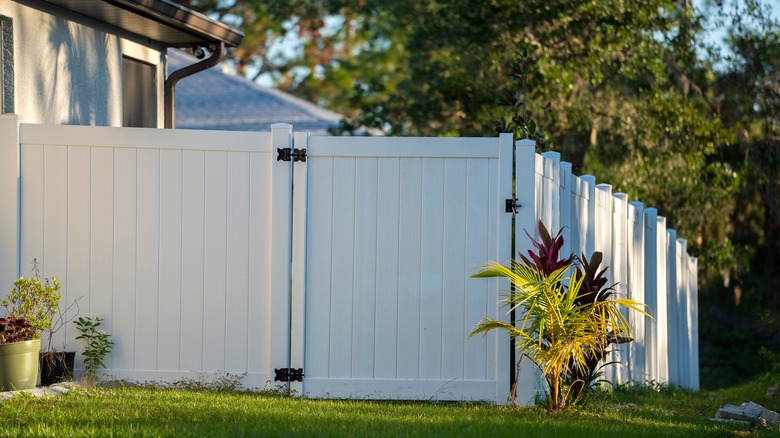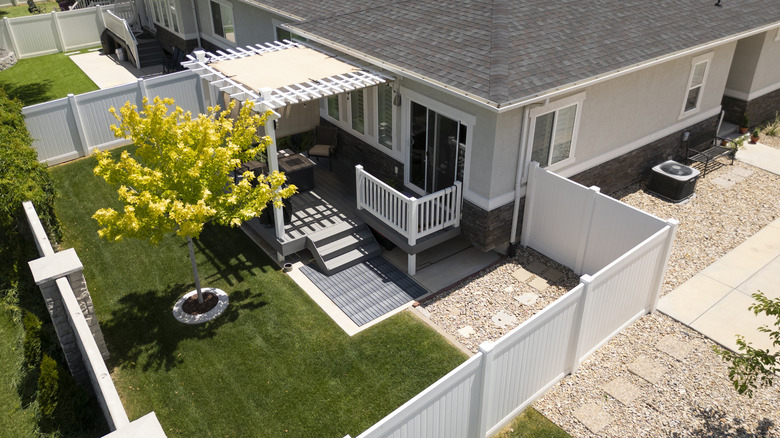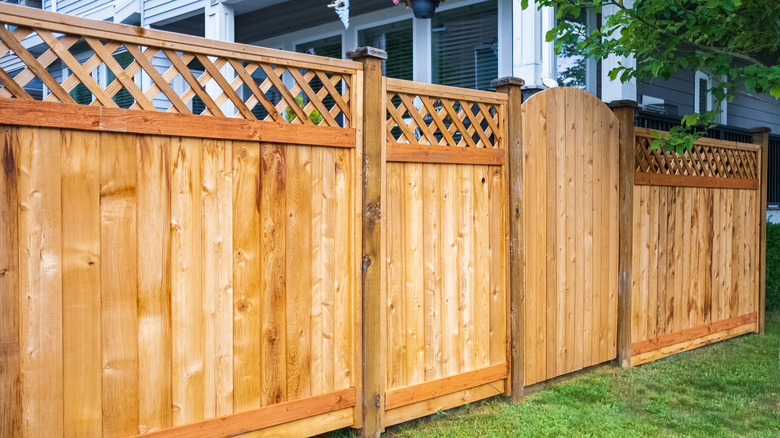Will Installing A Fence Increase The Value Of Your Home? Here's What We Know
If you plan to sell your home in the future, you may be on the lookout for ways to improve your home's resale value. While having a fenced yard is certainly a desirable feature, especially a brand new fence, it may not always lead to increased value for your home. Certain factors will make your fence more valuable to buyers, such as the amount of privacy, security, and noise reduction that it affords. It's also important to choose the right back yard fencing, as the material plays an important role in signaling value, or conversely, detracting from the home's overall appeal if poorly chosen.
According to KW Appraisal Group, a home appraisal company based out of New York, homeowners typically recoup around 30% to 40% of what they paid for the new fence installation upon selling. Therefore, the return on the investment (ROI) may not be as great as expected. Other sources claim that the ROI is higher for fence installations, ranging between 50% and 70%. From this, it's safe to assume that the ROI is situational and will vary based on the other factors surrounding your home. However, there's no denying that professionally installed and high-quality fencing will instantly boost your curb appeal, which tends to go a long way with potential buyers.
The potential value of installing a fence on your property
A newly-installed fence could increase your home's value, but the outcome will largely depend on the situation. Certain factors related to your home and the surrounding area will make the fence more valuable. For example, homes in family-oriented neighborhoods that will attract buyers with children and pets benefit from a fully fenced yard. Privacy fences are also important in more urban areas as they add a sense of security, reduce noise, and enhance the atmosphere of the back yard. Buyers will be particularly interested in a more secure fence if break-ins are common in the area, if the home is near a busy road, or if the back yard has a pool. Further, it may be worthwhile to install a new fence if your current fence is in poor condition, as it may enhance your home's appeal.
When installing a fence, it is essential to ensure that the job is executed properly. A fence that encroaches on the neighbor's property line, or is built over tree roots, uneven ground, or near utility lines could lead to greater issues down the road. These issues could very well come to light during the home inspection process. A poorly installed fence or a fence installed in non-beneficial areas of the property may repel buyers. For example, a privacy fence around the front of the home will impact the home's curb appeal and could actually reduce the home's value. The material of the fence is also important as it should be both durable and visually attractive to add real value.
Fencing materials to consider and avoid
If you believe that installing a new fence will make your home more valuable, choosing the right material is an essential part of the process. The most common materials used today are wood, composite, vinyl, and metal. Each has its advantages and potential drawbacks to consider. The cheapest available options are chain-link and split-rail fences. However, these more affordable types do not add much privacy, security, or visual appeal, and therefore should be avoided if your goal is to add value to your property.
As far as metal fences go, the best options are aluminum, steel, and wrought iron. Wrought iron is a high-end style that comes in many ornate customizations, while aluminum and steel are more financially accessible. The disadvantage of metal fences is that they come in styles that do not typically afford the same privacy as other options. Wood fences provide a stylish natural look and plenty of privacy, with lower installation costs than metal and vinyl. However, they are prone to rot and moisture damage, so ongoing maintenance is essential. Certain types of wood, such as cedar and redwood, tend to be more durable. Vinyl and composite fences are more eco-friendly, as they are made from recycled materials. They are visually appealing, low-maintenance, and long-lasting. They also offer excellent security and privacy. The main drawback is that it can be costly and must be installed by experienced professionals to avoid instability. These fences are also harder to repair and could become damaged from high heat and direct sunlight.


